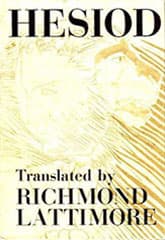Works and Days
Critique • Quotes
 1968 collection
1968 collectionFirst publication
c.700 BCE
Literature form
Poem
Genres
Instructional, philosophical
Writing language
English
Author's country
United States
Length
Approx. 1,000 lines
Ancient farmer's almanac
Works and Days is so different from Theogony that many scholars think it couldn't have been composed by the same author.
Which sounds like welcome news for anyone who yawned through Theogony and now faces the apparent sequel.
But I said Works and Days, attributed to Hesiod, is different from, not necessarily better than, Theogony. In fact it's both better and worse in different ways.
It starts off similarly—with stories about the gods, more or less picking up where Theogony left off, with Zeus reigning as chief god and with various mischief afoot. Such as the famous story of Pandora's box which was a trick played among the gods and ended up loosing pain and evil into the world of men.
Not exactly Homer-quality in storytelling but not bad little vignettes.
Sending the message
But after a few of these you realize the stories have a more direct purpose—to teach moral and practical lessons. I believe that all literature has to do with morality ultimately, so this is not a bad thing in itself.
But Hesiod's stories in Works and Days are simplistic morality tales, and after a while he drops the story part altogether and just spits out the messages one after the other.
The conceit of Works and Days is that the narrator, a farmer it seems, is trying to school his indebted brother Perses on how to put his life right. The observations range from the semi-profound ("The gods desire to keep the stuff of life / Hidden from us. If they did not, you could / Work for a day and earn a year's supplies...") to the mundanely prudent ("avoid men's gossip which / Is wicked") to the superstitious ("Plants do not prosper on the midmonth sixth, / But it's a lucky birthday for a male / Unfavourable for girls, either for birth / Or marriage").
Sort of the Farmer's Almanac of its time.
— Eric
Critique • Quotes

